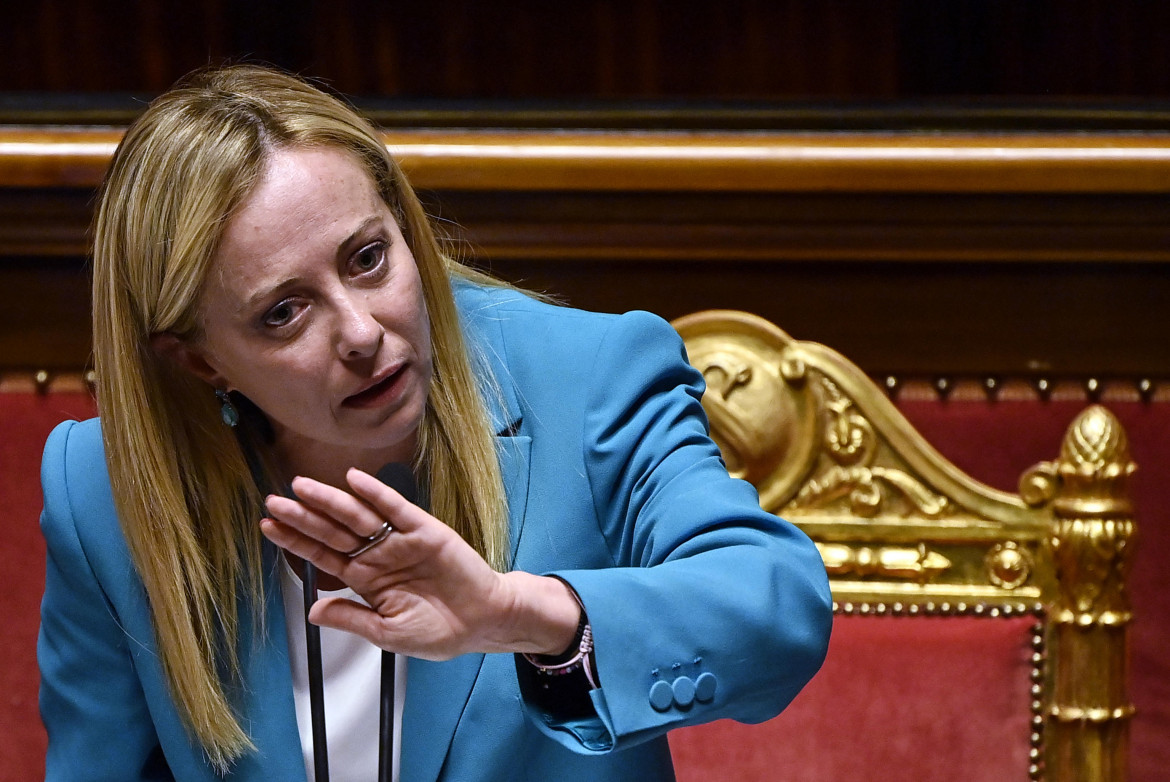Commentary
Inside the mind of an underdog
The premier's embarrassment stems from the contradiction between her political brain, which urges her to end a conflict she has always wanted to avoid as soon as possible, and the emotional reaction that drives her to always circle the wagons.

Giorgia Meloni deflects and dodges: “Sorry, I’m running late. We’ll talk about it after the NATO summit.” The scene would fit perfectly in an Alberto Sordi comedy. In a scandal-filled week, the prime minister could not find a moment to address the institutional clash she herself provoked with the declaration of war against the judiciary she made via leaks from “sources at the Chigi Palace.” Somehow fittingly, as she hadn’t spent any time to reflect on the consequences either.
In recent Italian history, the government intruding into the sphere of the judiciary is a reality that only those who have repeatedly taken advantage of it can still deny.
On this occasion, however, her reaction was completely unjustified, both in the case of the Tourism Minister’s disastrous performance when answering questions about her business dealings in the Senate and in the case of the mandatory indictment against Undersecretary Delmastro, which, if we look at the grounds for the Rome prosecutor’s request for dismissal of the charges, is an entirely normal development.
However, the premier’s initial error was magnified and amplified by her silence afterwards, which, as the days passed, became not only damaging but veered into the surreal. It’s obvious that a judiciary which, in terms of strength and power, has been reduced to a pale shadow of what it once was has no intention of waging war against this government. And before the blunders in question, the premier also was, and is, just as eager to return to a non-warlike posture. For many months, the standing order to her troops has been to avoid clashes with the judiciary. Undersecretary Mantovano is now handling the matter instead of the cringeworthy Justice Minister – a magistrate himself and champion of dialogue with his former colleagues. The separation of the career tracks of judges and prosecutors, the only plan that would really trigger Armageddon between government and the magistrates, remains on the agenda, and serves only as a powerful rhetorical device. Giorgia Meloni’s unhinged reaction and subsequent total silence thus appear almost inexplicable.
And they really are inexplicable if we continue to pretend that this clash is about justice reform, and that the right wing in power in Italy still retains some impulse, no matter how diluted, to fight for constitutional rights. The reality is precisely the opposite: by political culture, historical tradition and personal attitude, the premier is a casual “lock ’em up and throw away the key” kind of person. The mere thought of coming into conflict with a guardian of order, whether in uniform or in a toga, is enough to mystify her and make her reflexively bow her head. The commitment to decisively challenge the power of the judiciary was the price she had to pay in order to get Silvio Berlusconi on board, but the Knight is no longer with us, and in any case, the new leader of the right didn’t take him all that seriously when he was alive.
The premier’s overreaction has nothing to do with any real intention to radically reform the justice system at the cost of an ensuing conflict between the powers of the state, but has a much less lofty explanation: namely, her tendency as party head to always defend her own, to interpret any harsh criticism directed at those close to her as an affront. Even when, as in the Santanchè case, there has been little to no loyalty displayed by the latter; and obviously much more so when a loyalist like Delmastro or a close relative like Senate President La Russa is involved. Indeed, without those strong ties, it’s highly likely that the prime minister would have somehow signaled her disapproval of the two, out of an inherent tendency to criminalize an alleged victim.
The premier’s embarrassment stems from the contradiction between her political brain, which urges her to end a conflict she has always wanted to avoid as soon as possible, and the emotional reaction that drives her to always circle the wagons in defense of her own, making an enemy out of anyone who dares to question them. This is not an unconscious reaction. It’s the typical reflex of underdog political organizations and parties: small, always haunted by the thought they’re being surrounded by enemies, prone to paranoid tendencies, convinced that they can only hold on by virtue of a kind of solidarity bordering on a Mafia-like omertà. Removing the MSI flame from her party’s logo is not the real problem for Giorgia Meloni. It’s getting it out of her head – a harder task to accomplish.
Originally published at https://ilmanifesto.it/nella-testa-di-una-underdog on 2023-07-11
